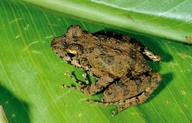|
Description
M 33-34 mm, F 32-34 mm. Tibiotarsal articulation reaches between eye and nostril. Hand without webbing, foot webbing 1(1), 2i(2), 2e(1), 2i(2.5), 3e(2), 4i(3), 4e(3), (1.5). Dorsal skin granular. Colour dorsally brown with indistinct darker markings. Venter whitish, in some populations yellowish on the posterior belly and limbs, throat dark except for a light median stripe. Males with a blackish paired subgular vocal sac. Femoral glands distinct and large in some populations, rather indistinct in other populations.
Distribution and Habitat
Country distribution from AmphibiaWeb's database: Madagascar
Ankarana, Benavony, Berara forest, Lokobe, Manongarivo, Marojejy, Montagne d’ Ambre, Nosy Be, Nosy Komba, Tsaratanana (Andampy campsite).
It has been recorded from sea level up to 900m (Andreone and Raxworthy 2008).
Life History, Abundance, Activity, and Special Behaviors
Habits: Males call during day and night in primary forest. Most intensive calling has been heard in the very early morning during dawn. Calling specimens sit on the ground or in elevated positions on trees, and are not always aggregated around water. One female laid 12 large yellowish eggs. Tadpoles in streams.
Calls: Typically a rapid series of three notes; several (about three) such note series emitted one after the other, followed by long intervals of silence. Very loud and difficult to locate.
Trends and Threats
This species is listed as least concern since, although its Extent of Occurrence is probably less than 20,000 km2, it is common and adaptable with a presumed large population, and it is unlikely to be declining fast enough to qualify for listing in a more threatened category (Andreone and Raxworthy 2008). Comments
Taken with permission from Glaw and Vences (2007).
References
Andreone, F. and Raxworthy, C. (2008). Gephyromantis pseudoasper. In: IUCN 2008. 2008 IUCN Red List of Threatened Species. www.iucnredlist.org. Downloaded on 18 March 2009.
Glaw, F., and Vences, M. (2007). Field Guide to the Amphibians and Reptiles of Madagascar. Third Edition. Vences and Glaw Verlag, Köln.
Originally submitted by: Miguel Vences and Frank Glaw (first posted 2000-11-30)
Edited by: Catherine Aguilar (2009-04-07)Species Account Citation: AmphibiaWeb 2009 Gephyromantis pseudoasper <https://amphibiaweb.org/species/4620> University of California, Berkeley, CA, USA. Accessed Nov 13, 2024.
Feedback or comments about this page.
Citation: AmphibiaWeb. 2024. <https://amphibiaweb.org> University of California, Berkeley, CA, USA. Accessed 13 Nov 2024.
AmphibiaWeb's policy on data use.
|
